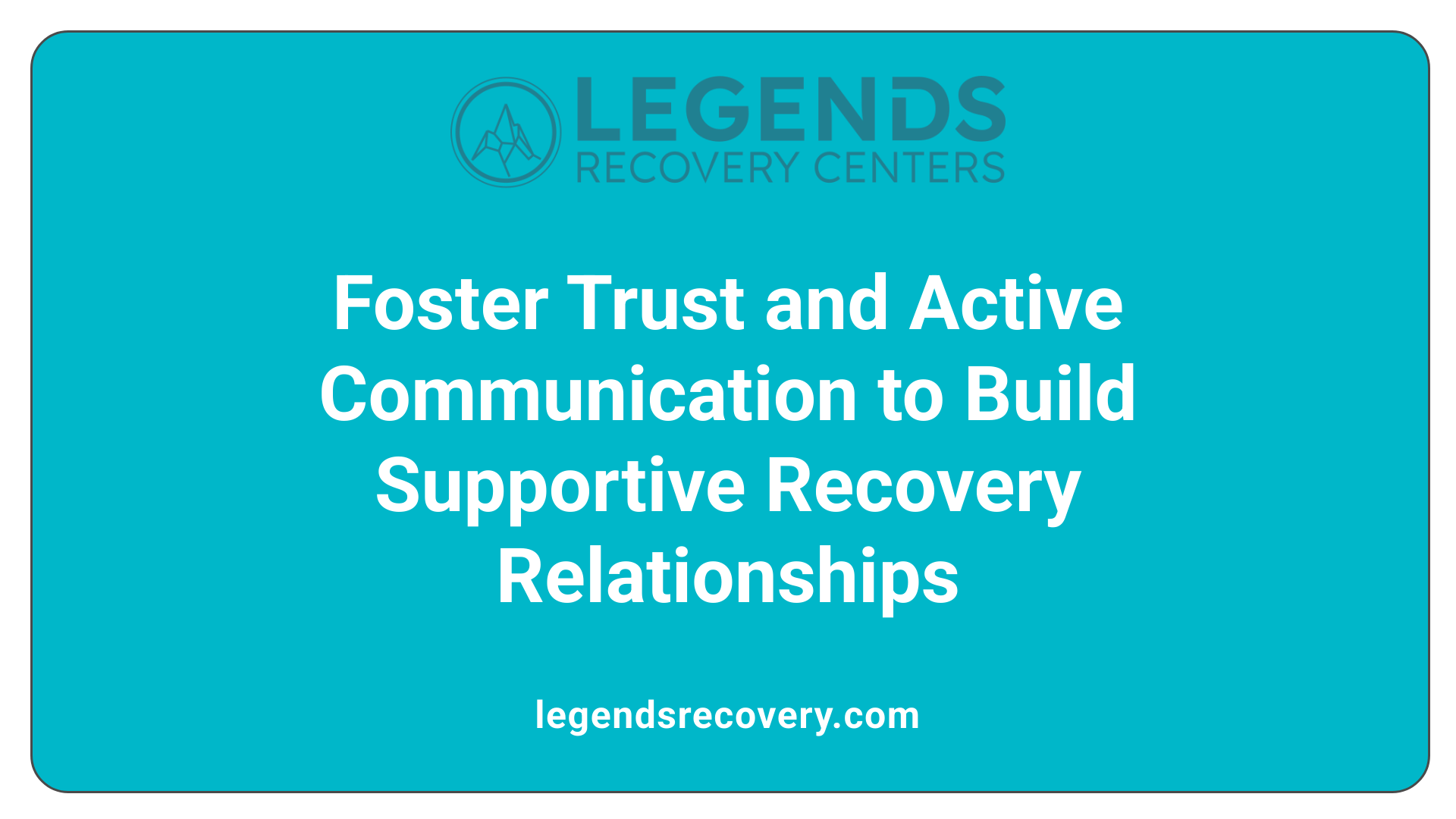Building a Robust Support System to Sustain Sobriety

Maintaining long-term sobriety is a complex journey that extends beyond initial treatment. An effective recovery support network acts as a lifeline, offering essential emotional, practical, and social support to navigate the challenges of sobriety. This comprehensive guide explores how to strengthen and develop your recovery network to ensure sustained success and well-being.

Support systems serve as the backbone of sustained recovery, offering emotional encouragement, practical assistance, and accountability. They help individuals face and manage the difficulties that arise during recovery by providing a sense of belonging and understanding.
Research shows that social support from family, friends, peer groups, and community organizations like Alcoholics Anonymous (AA) enhances treatment retention, increases abstinence, and boosts self-efficacy. These networks buffer stress and reduce relapse risks by providing guidance, shared experience, and emotional validation.
Connecting with others through mutual help groups and supportive friendships prevents feelings of isolation, which can trigger relapse. Overall, a strong supportive system addresses both the emotional and social aspects of recovery, reinforcing motivation and improving long-term sobriety outcomes.
An effective recovery network is characterized by its ability to foster strong, trusting relationships that provide continuous emotional support. It includes various accessible resources such as peer support groups, mentors, and community involvement opportunities to strengthen resilience.
A reliable system incorporates clear communication channels and regular check-ins with family, friends, and health professionals to ensure ongoing responsiveness. Additionally, setting personalized recovery strategies, reviewing progress, and adjusting plans help maintain effectiveness.
Holistic considerations—such as cultural sensitivities, individual preferences, and personal goals—are vital. Empowerment, respect, and hope are foundational principles that guide successful recovery networks. They facilitate ongoing personal growth, teach coping skills, and cultivate a sense of purpose and responsibility.
| Component | Role & Importance | Details |
|---|---|---|
| Trusted family and friends | Emotional and practical support | Offer everyday encouragement, help establish boundaries, and rebuild trust when needed |
| Peer support groups (AA, NA) | Shared experiences and mutual motivation | Provide community, accountability through sponsors, and structured meetings |
| Professional support | Clinical guidance and therapy support | Therapists, counselors, and addiction specialists offer tailored strategies and emotional processing |
| Mentors with lived recovery experience | Personal guidance and hope | Share successful recovery strategies, offer ongoing mentorship and motivation |
| Crisis resources (helplines) | Immediate help during emergencies | 24/7 helplines and crisis intervention services ensure timely support |
These components collectively create a comprehensive safety net that helps sustain sobriety, manage setbacks, and foster growth.
Building and maintaining a well-rounded support system is vital for long-term recovery success. It not only helps manage immediate challenges but also nurtures resilience and personal development.
Engagement with peer groups and professional services reduces feelings of loneliness and isolation, major risk factors for relapse. Establishing trust and communication in relationships ensures that support is tailored to evolving needs.
Participating in community and recreational activities enhances social connections, provides purpose, and strengthens resolve.
A resilient recovery network—comprising family, friends, support groups, mentors, and crisis services—acts as a safety net, motivating individuals to stay committed to their sobriety journey and face future challenges with confidence.

Reconnecting with loved ones and friends is a foundational step in building a reliable support system. Begin by reaching out honestly about your recovery journey, and express your needs for understanding and encouragement. Restoring trust takes time, so be patient and consistent in your efforts. It’s important to set clear boundaries and communicate openly to rebuild those relationships on a healthier, supportive basis. Sharing your progress and setbacks openly fosters mutual trust, and involving them in sober activities can help strengthen bonds.
Participating in community support groups provides shared experiences and accountability. Attending regular meetings of Alcoholics Anonymous (AA), Narcotics Anonymous (NA), or SMART Recovery offers a safe environment to exchange stories, gain practical advice, and receive ongoing encouragement. These groups often have resources like contact lists, sponsors, and structured programs that bolster your commitment. Whether in-person or online, engaging consistently with these communities helps you feel connected to others who understand your struggles.
Professional guidance from therapists, counselors, and recovery coaches plays a critical role in personalized recovery planning. They help identify triggers, develop coping mechanisms, and address co-occurring mental health issues. Regular sessions provide emotional support and accountability while offering expert insights into managing challenges. Many treatment facilities also offer structured programs such as Intensive Outpatient Programs (IOPs), which combine therapy with peer support—enhancing your overall network.
Getting involved in community activities and sober social events helps create meaningful connections outside of recovery settings. Volunteering, attending sober gatherings, or joining hobby groups fosters a sense of purpose, belonging, and responsibility. These activities reduce isolation and reinforce your commitment to a sober lifestyle. Events like recovery walks and local meetups not only build social bonds but also provide ongoing motivation.
Consistency and transparency are vital for a strong support system. Regular check-ins via phone calls, texts, or in person help reinforce relationships. Being honest about your feelings, struggles, and successes builds trust and encourages others to support you effectively. Practicing active listening and expressing gratitude foster mutual respect. Honesty and open communication create a supportive environment where setbacks are addressed constructively.
A sustained commitment ensures that your support network remains resilient over time. Building habits such as regular participation in support groups, therapy sessions, and sober social activities maintains accountability and emotional resilience. Long-term engagement helps you navigate life's challenges, reinforces your motivation, and prevents relapse. It also allows your support network to grow deeper and more meaningful, providing a safety net during difficult moments.
| Aspect | Benefits | Additional Details |
|---|---|---|
| Reconnecting with loved ones | Emotional grounding, trust rebuilding | Patience, honest communication, shared activities |
| Joining support groups | Shared experience, practical tools | Consistency, community resources, sponsorship |
| Engaging with professionals | Personalized guidance, emotional support | Therapy, coaching, structured programs |
| Participating in community activities | Purpose, social connection | Volunteering, hobbies, sober events |
| Maintaining contact | Trust, accountability | Regular calls, honesty, active listening |
| Long-term commitment | Resilience, relapse prevention | Ongoing participation, relationship nurturing |
Building and sustaining a recovery support network requires effort and dedication. Combining personal reconnecting, joining peer groups, engaging with professionals, and maintaining honest communication creates a strong foundation. This network becomes essential for resilience, accountability, and emotional well-being—integral elements for a sustained, successful sobriety journey.

Aftercare planning is crucial for maintaining long-term sobriety. It provides continuous support and customized strategies to help individuals handle ongoing challenges after completing initial treatment. This process often involves engaging in therapy sessions, participating in support groups such as AA or NA, and living in sober environments like halfway houses or sober living homes.
One of the main benefits of aftercare is its focus on developing strong coping mechanisms. These tools help individuals manage triggers and prevent relapse. Regular check-ins with mental health professionals or sponsors ensure that recovery remains on track, allowing for timely adjustments when needed.
Additionally, aftercare encourages healthy lifestyle changes, emphasizing physical wellness activities such as exercise and meditation. These activities support mental clarity, reduce stress, and boost overall well-being.
Building resilience and confidence is another essential aspect. As individuals navigate recovery, gaining self-esteem and emotional stability reinforces their commitment to sobriety.
Recovery strategies must evolve with changing life circumstances. Flexibility in goals and approaches ensures that individuals remain resilient despite new challenges or setbacks.
Specifically, lifestyle modifications play a significant role. Incorporating wellness activities like mindfulness, balanced nutrition, and engaging hobbies helps fill the void left by substance use, fostering a purposeful and satisfying life.
Overall, effective aftercare planning significantly increases the likelihood of sustained sobriety. It addresses the complex, ongoing needs of individuals in recovery by offering a comprehensive, adaptable framework designed to support lifelong abstinence and well-being.

Maintaining long-term sobriety involves developing and consistently applying a set of skills and habits that reinforce recovery and resilience. One fundamental aspect is stress management. Techniques like mindfulness meditation, deep breathing exercises, and relaxation practices can help individuals manage anxiety and cravings, reducing the likelihood of relapse.
Effective communication and emotional regulation are also vital. Learning to express feelings honestly and assertively, while listening actively to others, fosters healthy relationships and provides emotional support during challenging times. Building emotional resilience through these skills helps individuals navigate setbacks or difficult situations without resorting to substances.
A structured daily routine supports stability. This includes getting enough sleep, following a nutritious diet, and engaging in regular exercise. Such routines promote physical health, elevate mood, and decrease stress levels, creating a solid foundation for recovery.
Problem-solving and relapse prevention strategies are crucial tools. Identifying potential triggers, developing coping mechanisms, and having clear plans for managing cravings help individuals stay on track. Recognizing early warning signs of relapse allows for proactive response, such as reaching out for support or engaging in calming activities.
Setting healthy boundaries is another important habit. This involves avoiding environments or relationships that pose risks to sobriety and establishing limits with people who may encourage substance use. Practicing cognitive restructuring helps challenge and modify negative beliefs about oneself or substance use, fostering a more positive outlook.
Celebrating milestones—such as one month or one year of sobriety—and rewarding oneself for progress boosts motivation and self-esteem. These positive reinforcements reinforce commitment to sobriety and recognize personal growth.
Engaging regularly in community support groups like AA, NA, or SMART Recovery offers shared experiences and accountability, strengthening the support network vital for sustained recovery. Incorporating life skills such as managing finances, employment, and independence enhances confidence and long-term stability.
Overall, cultivating these habits and skills creates a resilient mindset capable of facing life's challenges, supporting ongoing sobriety, and fostering a sense of purpose and well-being.

Building strong, supportive relationships during recovery is essential for maintaining sobriety and emotional well-being. One of the first steps involves establishing mutual trust and honesty. When both parties are open, transparent, and sincere, it creates a safe space where individuals feel comfortable sharing their struggles, successes, and setbacks.
Active communication plays a vital role. Listening attentively and empathetically helps foster understanding and respect. Engaging in regular conversations, whether with peers in support groups or with family and friends, reinforces bonds and encourages emotional safety.
Participating in shared activities is another effective method. Attending support groups like Alcoholics Anonymous (AA) or Narcotics Anonymous (NA), engaging in therapy sessions, or participating in sober social events can build connections rooted in common goals and experiences. These shared moments promote vulnerability and a sense of belonging, which is crucial during the emotional healing process.
Setting and maintaining healthy boundaries forms the foundation for respectful relationships. It involves clearly defining what is acceptable regarding substance use and personal needs, helping prevent relapse triggers. Boundaries ensure that relationships remain supportive yet respectful of individual limits.
Rebuilding trust and repairing past harm often require patience and responsibility. Making amends when appropriate, showing consistency, and demonstrating genuine efforts to change help heal fractured relationships. These actions highlight sincerity and commitment to recovery.
Lastly, prioritizing personal well-being and understanding that recovery is a journey help foster lasting relationships. When individuals focus on self-care—getting enough rest, eating healthy, and managing stress—they are better equipped to engage meaningfully with others.
Collectively, these strategies create a supportive environment that not only encourages sobriety but also promotes emotional growth and resilience, ensuring long-term success in recovery.
Developing and strengthening a recovery support network is a vital aspect of achieving and maintaining long-term sobriety. It involves leveraging the right resources, building trustworthy relationships, and actively engaging in community and professional support systems. Continual effort in expanding and nurturing this network not only provides emotional resilience and accountability but also fosters a sense of belonging and purpose. Combined with effective aftercare planning, personal skill development, and commitment to healthy habits, a well-rounded recovery network creates the foundation for lasting sobriety and a healthier, more fulfilling life.